2023届高考英语二轮复习专题一:冠词和名词课(57张ppt)
文档属性
| 名称 | 2023届高考英语二轮复习专题一:冠词和名词课(57张ppt) |

|
|
| 格式 | pptx | ||
| 文件大小 | 731.8KB | ||
| 资源类型 | 教案 | ||
| 版本资源 | 通用版 | ||
| 科目 | 英语 | ||
| 更新时间 | 2023-02-04 08:33:18 | ||
图片预览

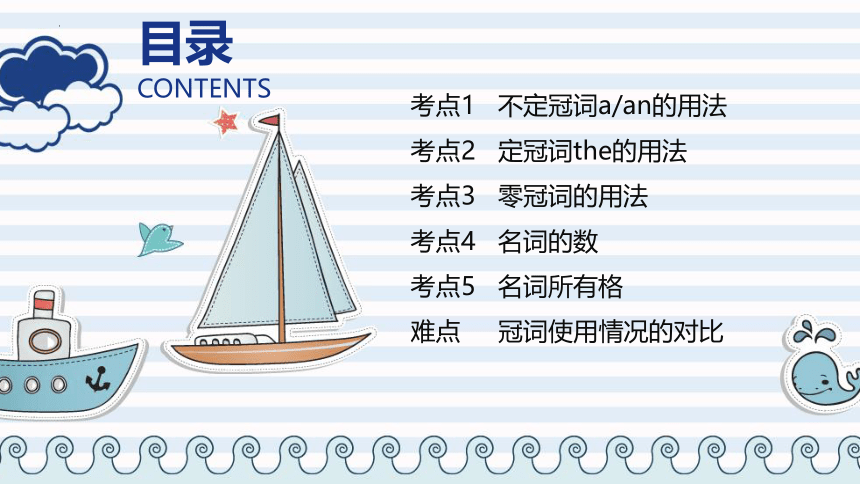
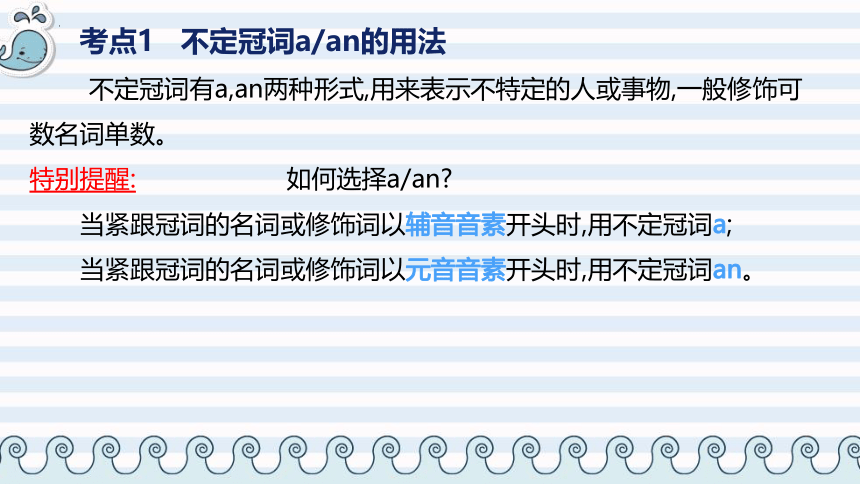

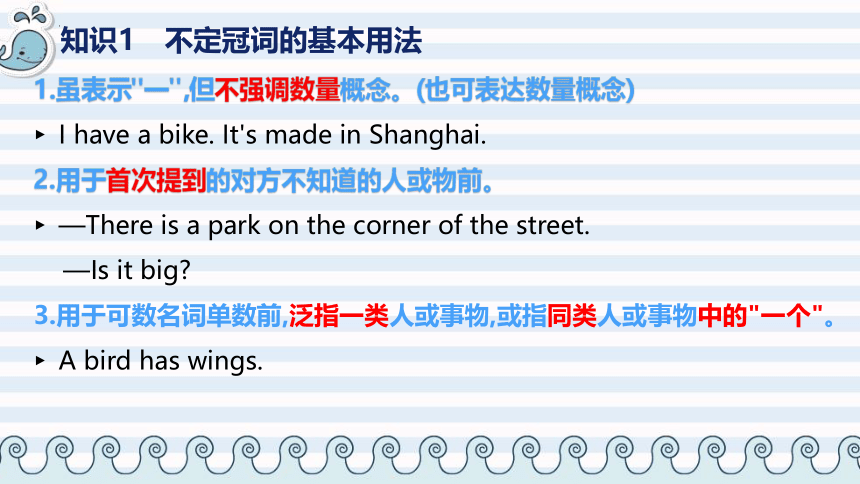
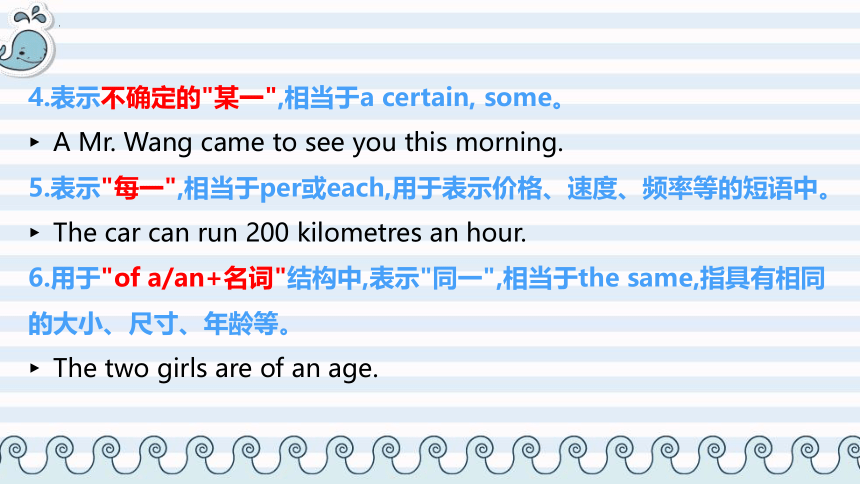
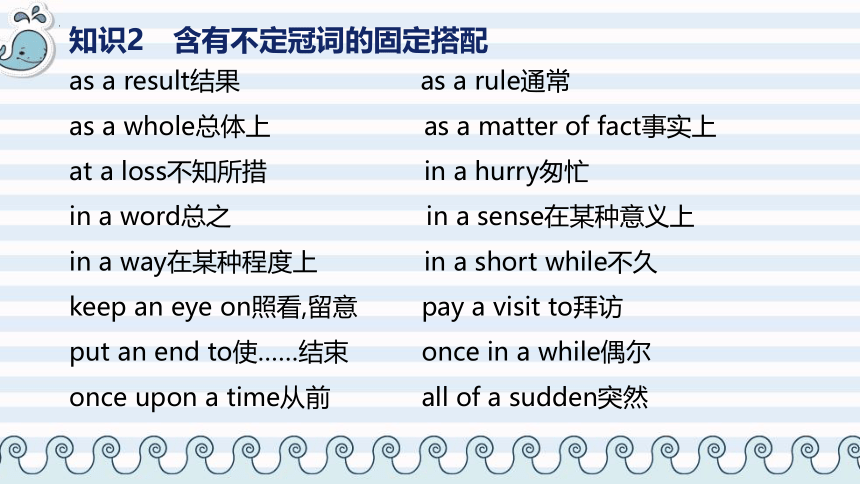
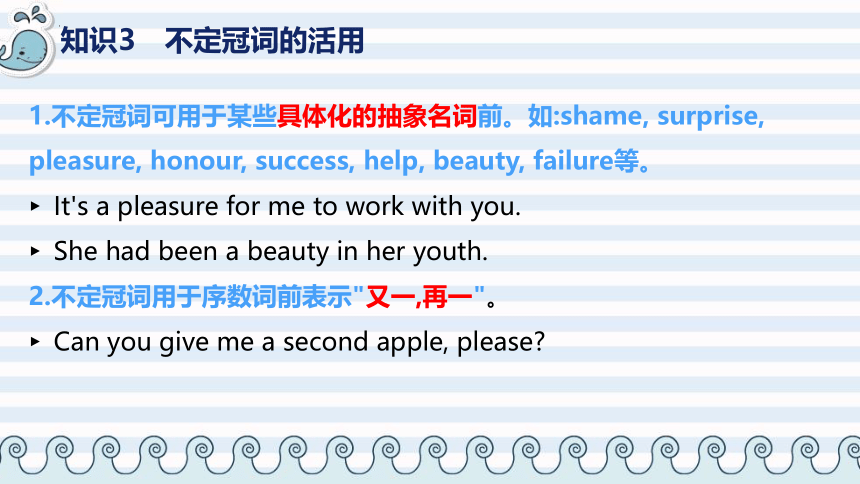
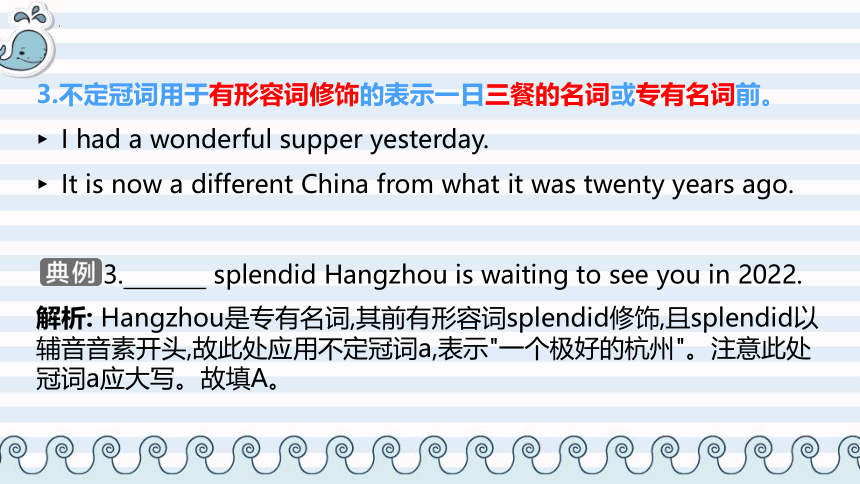

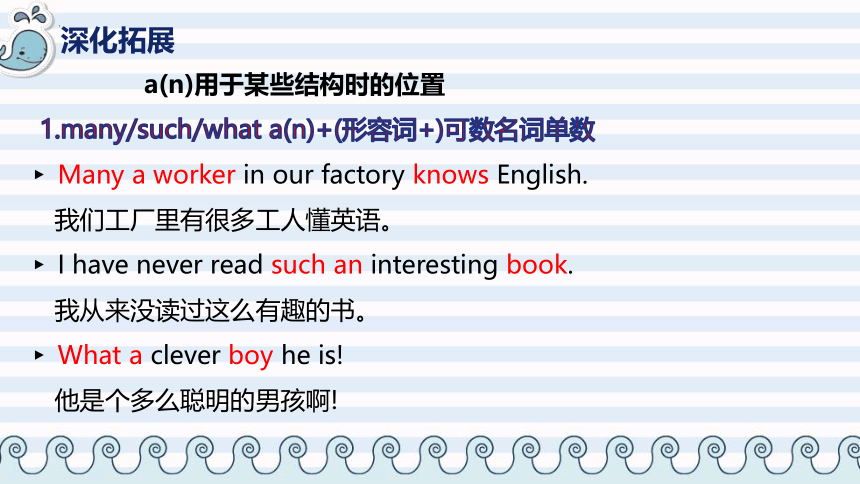

文档简介
(共57张PPT)
高三语法总复习
专题一 冠词和名词
目录
CONTENTS
考点1 不定冠词a/an的用法
考点2 定冠词the的用法
考点3 零冠词的用法
考点4 名词的数
考点5 名词所有格
难点 冠词使用情况的对比
考点1 不定冠词a/an的用法
不定冠词有a,an两种形式,用来表示不特定的人或事物,一般修饰可数名词单数。
特别提醒: 如何选择a/an
当紧跟冠词的名词或修饰词以辅音音素开头时,用不定冠词a;
当紧跟冠词的名词或修饰词以元音音素开头时,用不定冠词an。
【注意】1.拼写以辅音字母开头,发音却以元音音素开头的单词,如: hour,honest,honor,NBA等,其前要用an。
2.拼写以元音字母开头,发音却以辅音音素开头的单词,如: useful, university,usual,unit,uniform,European等,其前要用a。
1
Confucius was extraordinary educator and philosopher, and founded Confucianism.
解析 句意:孔子是一位杰出的教育家和哲学家,他创立了儒家学说。此处表泛指,且extraordinary的发音以元音音素开头,故应用不定冠词an。
知识1 不定冠词的基本用法
1.虽表示"一",但不强调数量概念。(也可表达数量概念)
I have a bike. It's made in Shanghai.
2.用于首次提到的对方不知道的人或物前。
—There is a park on the corner of the street.
—Is it big
3.用于可数名词单数前,泛指一类人或事物,或指同类人或事物中的"一个"。
A bird has wings.
4.表示不确定的"某一",相当于a certain, some。
A Mr. Wang came to see you this morning.
5.表示"每一",相当于per或each,用于表示价格、速度、频率等的短语中。
The car can run 200 kilometres an hour.
6.用于"of a/an+名词"结构中,表示"同一",相当于the same,指具有相同的大小、尺寸、年龄等。
The two girls are of an age.
知识2 含有不定冠词的固定搭配
as a result结果 as a rule通常
as a whole总体上 as a matter of fact事实上
at a loss不知所措 in a hurry匆忙
in a word总之 in a sense在某种意义上
in a way在某种程度上 in a short while不久
keep an eye on照看,留意 pay a visit to拜访
put an end to使……结束 once in a while偶尔
once upon a time从前 all of a sudden突然
知识3 不定冠词的活用
1.不定冠词可用于某些具体化的抽象名词前。如:shame, surprise, pleasure, honour, success, help, beauty, failure等。
It's a pleasure for me to work with you.
She had been a beauty in her youth.
2.不定冠词用于序数词前表示"又一,再一"。
Can you give me a second apple, please
3.不定冠词用于有形容词修饰的表示一日三餐的名词或专有名词前。
I had a wonderful supper yesterday.
It is now a different China from what it was twenty years ago.
3. splendid Hangzhou is waiting to see you in 2022.
解析: Hangzhou是专有名词,其前有形容词splendid修饰,且splendid以辅音音素开头,故此处应用不定冠词a,表示"一个极好的杭州"。注意此处冠词a应大写。故填A。
4.不定冠词可用于"take/have a+名词"结构,表示一次性的动作。如:have a rest休息,take a walk散步,have a talk with sb.与某人谈话。
Jack had a sound sleep last night.
深化拓展
a(n)用于某些结构时的位置
1.many/such/what a(n)+(形容词+)可数名词单数
Many a worker in our factory knows English.
我们工厂里有很多工人懂英语。
I have never read such an interesting book.
我从来没读过这么有趣的书。
What a clever boy he is!
他是个多么聪明的男孩啊!
It's quite a small house.
这是一所相当小的房子。
That's rather a/a rather sudden change.
那一变化相当突然。
3.so/too/as/how+形容词+a(n)+可数名词单数
She is so good a girl that all the people like her.
她是一个非常好的女孩,所有人都喜欢她。
考点2 定冠词the的用法
知识1 定冠词的基本用法
1.前面已提及的人或物再次被提到时,或谈话双方都知道的人或物前,一般要加定冠词the,表特指。
He bought a house.I've been to the house.
2.用于可数名词单数前,表示一类人或事物。
The rose is my favourite flower.
拓展延伸
"the+形容词(含分词形容词)"也可表示一类人或事物。
常见的有: the poor/rich 穷人/富人 the old/young 老人/年轻人
the dead/sick 死人/病人 the weak/strong 弱者/强者
the injured/unemployed 伤员/失业者
the missing/living 失踪的人/活着的人
3.用于由短语或从句修饰的名词前,表特指。
The key to the safe is lost.
The restaurant where I had my dinner last night is great.
4.用于指世界上独一无二的事物。
The earth goes around the sun.
5.用于序数词、形容词/副词最高级以及形容词only,very,same等之前。
Is this the first time you have visited Beijing
He is the tallest in his class.
That's the very thing I've been looking for.
4.Over 100 panda fans sang Happy Birthday and enjoyed cake as they celebrated 38th birthday of Xin Xing.
解析 此处表示庆祝大熊猫新星38岁生日。根据空后面的序数词38th可知,空处需要用定冠词the。
6.用于表示姓氏的名词复数之前,表示一家人或夫妇二人。
The Greens are on holiday now.
7.用于某些表示方向、方位、时间、方式等的固定短语中。
in the east/south/west/north 在东/南/西/北方
on the right/left 在右/左边 in the morning/afternoon 在早上/下午
8.用于表示演奏的西方乐器前。中国乐器前一般不用冠词the。
She is learning to play the piano/guitar.
My father is good at playing erhu.
特别提醒: 若不是表示演奏某种西方乐器,而只是简单提及乐器本身或者乐器前有修饰语时,表示乐器的名词前不一定要用定冠词the。
There is a violin in his room.
She is playing a borrowed violin.
9.用于表示江河、湖泊、海洋、山脉、岛屿、海湾、海峡、报纸、书籍、会议、条约、某些国家或组织等的专有名词前或者某些由普通名词构成的专有名词前。
the Pacific Ocean太平洋 the Thames 泰晤士河
the Yellow River黄河 the Himalayas喜马拉雅山脉
the Odyssey《奥德赛》 the USA美国
the Great Wall长城 the World Cup世界杯
the World Table Tennis Championship世界乒乓球锦标赛
知识2 含有定冠词的固定搭配
make the most/best of充分利用 in the end最后
by the way顺便说一下 in the distance在远处
in the face of面对 on the whole总的来说
at the same time同时 on the other hand另一方面
to tell(you) the truth说实话 for the time being 暂时
on the spot在现场 not in the least一点也不
the other day前几天 take the place of代替
5. Today, the Long March for us is to achieve the "Two Centenary Goals" as well as Chinese Dream of national rejuvenation(复兴).
6. The author shows the extreme struggle of the characters in face of hardships, and describes the truth, the good and the beauty in human nature.
解析5: Chinese Dream为普通名词构成的专有名词,因此其前用定冠词the。
解析6: 句意:作者表现了人物面对苦难时的极端挣扎,描写了人性的真善美。in the face of为固定搭配,表示"面对",故填 the。
知识3 定冠词的特殊用法
1.用于表示世纪、年代、朝代的名词以及逢十的词前(指某个年代)。
in the 1990's 在20世纪90年代 the Qing Dynasty清朝
2.用于"动词(take/catch/pat/hit/…)+sb.+介词(by/in/on)+the+名词(身体某一部位)"结构。
【注意】名词前要用定冠词the,而不用物主代词。
他击中了我的头。
He hit me on the head.
He hit me on my head.
3.用于表示度量单位的单数名词前。
常见的有:by the hour/day/week/month/year/dozen/yard/ton/kilo,但是size/weight/time这类名词与by连用时不加冠词。
I hired the car by the hour.我按小时租了这辆车。
Apples are sold by weight.苹果按重量出售。
4.用于"the+比较级…,the+比较级…"(越……越……)结构。
The more careful you are, the fewer mistakes you'll make.
考点3 零冠词的用法
知识1 零冠词的基本用法
1.(第一次使用的)不可数名词前通常不用冠词。
Man needs air and water.
2.名词复数泛指一类人或事物时,其前不用冠词。
On weekends, shopping malls are always crowded with people.
3.表示街道、广场、公园、大学或某些杂志等的一些名词前,一般不用冠词。
Chang'an Street长安街 Tian'anmen Square天安门广场
Times Square 时代广场 Time《时代周刊》
Beihai Park北海公园 Tsinghua University清华大学
4.表示学科名称、球类运动、棋类游戏等的名词前不用冠词。
I am very interested in English.
He is fond of playing chess.
5.表示一日三餐等的名词前一般不用冠词。但若指具体的某顿饭或三餐前有形容词修饰时要用冠词。
The breakfast was well cooked.这顿早饭做得不错。
6.表示季节、月份、星期、节假日等的名词前往往不用冠词。
Now it is truly autumn. 现在真的是秋天了。
in September 在九月 on Monday 在周一 on Children's day 在儿童节
特别提醒
1.若特指某一段时间或特定的时间概念,则用定冠词the;若表示"某一个(种/……)"这类概念时,季节名词前要用不定冠词。
The spring of 2008 was a terrible spring.
2."in (the)+表示四季的名词"结构中,the可以带上,也可以省略。
in (the) spring 在春季
7.名词前已有this, that, my, your, some, each, no, any等指示代词、物主代词或不定代词时不用冠词。
My pen is much more expensive than yours.
8.表示独一无二的职位、头衔的名词作表语、同位语或补语时,其前不用冠词。
Mr. Brown, head of the group, will plan the whole trip.
知识2 含有零冠词的固定搭配
at present 目前 take part in 参加
in peace 和平地 by chance/accident 偶然
on purpose 故意 on second thought(s) 再一想
ahead of time 提前 in advance 事先
by law 根据法律 by mistake 错误地
under repair 处于维修中 lose heart 灰心
out of control失控 out of work 失业
in danger 处于危险之中 at risk 有危险
day and night 夜以继日 from morning till night 从早到晚
at daybreak/dawn/noon/dusk/night/midnight 在拂晓/黎明/正午/黄昏/夜晚/午夜
知识3 零冠词的特殊用法
1.turn(变成)后的可数名词单数作表语时,其前不用冠词。
但名词前若有形容词修饰,则要加冠词。
His brother has turned writer.
Later she turned a successful singer.
2."表示类型的名词+of+可数名词单数"这一结构中,可数名词单数前不用冠词。
This kind of question often appears in the exam.
3.与by连用的表示交通工具和通讯工具的名词之前不用冠词。
It's quicker by plane than by ship.
I sent the letter by airmail.
考点4 名词的数
知识1 可数名词
1.有些名词,单复数同形。
【注意】 根据上下文确定它们是单数还是复数。
(单数形式)sheep羊 deer鹿 Chinese中国人 Japanese日本人
(复数形式)species物种 series系列 means方式
特别提醒 fish指"鱼"时,复数形式用fish;指"许多种类的鱼"时,复数形式为fishes;指"鱼肉"时,为不可数名词。
2.有些单数形式的名词表示复数意义。
【注意】 此类名词作主语时,谓语动词用复数形式。
cattle 牛 people人们 police 警察
特别提醒 有些复数形式的名词,并不表示复数意义。
注意:此类名词作主语时,谓语动词用单数形式。如:
physics物理 maths数学 politics政治 news消息
3.一般而言,集体名词若强调一个整体,用作单数;若强调各个成员,用作复数。常见的集体名词有:audience观众, class班级, family家庭, group小组, committee 委员会。
Her family is well-known in the region.
她家在该地区很出名。(强调整体)
His family are all music lovers.
他们一家人都是音乐爱好者。(强调具体成员)
特别提醒 集体名词本身也有单复数变化。
Our grade is composed of twenty classes. 我们年级有二十个班级。
4.可数名词变复数的规则变化
构成方法 例词
1 一般在词尾加-s map→maps sea→seas girl→girls day→days
2 以-s,-x,-ch,-sh结尾的名词后加-es (如果词尾-ch的发音为/k/,要加-s,如stomach) class→classes box→boxes
watch→watches dish→dishes
3 以-f或-fe结尾的词 变-f或-fe为-v,再加-es leaf→leaves knife→knives wife→wives wolf→wolves life→lives thief→thieves
加-s belief→beliefs chief→chiefsroof→roofs gulf→gulfs
4 以辅音字母加-y结尾的名词,变-y为-i加-es party→parties family→familiesstory→stories
5 以元音字母加-y结尾的名词,加-s toy→toys boy→boysday→days ray→rays
构成方法 例词
6 以辅音字母加-o结尾的名词 加-es(有生命的词) hero→heroes potato→potatoes tomato→tomatoes
加-s(无生命的词) piano→pianos photo→photos kilo→kilos
两者皆可(有/无生命的词) volcano→volcanoes/volcanos
7 以元音字母加-o结尾的名词加-s radio→radios zoo→zoos bamboo→bamboos
8 以-th结尾的名词加-s truth→truths mouth→mouths month→months
巧学妙记 1.名词单数变复数规则变化歌诀:
名词单数变复数,直接加-s占多数。
词尾若是-s,-x,-sh,-ch,直接加上-es。
词尾若是-f或-fe,变-f/-fe为-v,再加-es。
辅音字母加-y,要变-y为-i加-es。
词尾字母若是-o,加-es的有hero,tomato和potato。
2.巧记变复数时变-f/-fe为-v,再加-es的名词:
妻子(wife)拿刀(knife)去砍狼(wolf),小偷(thief)见了着了慌,架子(shelf)底下躲己(self)命(life),半片(half)树叶(leaf)遮目光。
7 [2021浙江五校联考,64]Sheriff Chip Hughes spoke with reporters from several news (agency).
解析 agency是可数名词“机构”,根据空前的several可知,空处需要用名词复数,agency的复数形式要变-y为-i再加-es。故填agencies。
5.可数名词变复数的不规则变化
构成方法 例词
1 增加字母 child→children ox→oxen
2 改变名词中的元音字母或其他形式 man→men woman→women foot→feet goose→geese mouse→mice
3 单复数同形 sheep deer series means species
4 表示 "某国人"的名词 加-s American→Americans German→Germans Greek→Greeks
单复数同形 Portuguese Chinese Japanese
有些词以-man或-woman结尾,分别改为-men或-women Englishman→Englishmen
巧学妙记
名词单数变复数不规则变化歌诀:
oo变ee, foot→feet是一例;
男人女人a变e, (wo)man→(wo)men又一例。
还有几个要记准,child变children,ox变oxen法不一。
鹿和绵羊是一家,单复同形记心里。
8 —Where did you two have your (stomach) examined
—At the doctor's.We were examined by two famous (German).
解析 第一空指的是两个人的胃,所以stomach要用复数形式,又因为此单词中-ch的发音为/k/, 所以stomach变复数时要在后面加-s;由答语中的two可知,第二空所填词表示复数概念,German的复数形式为Germans。故填stomachs; Germans。
6.复合名词的单复数变化
复合名词 将主体名词变为复数 son-in-law→sons-in-law
looker-on→lookers-on
passer-by→passers-by
story-teller→story-tellers
无主体名词时,通常把最后一个词变为复数 grown-up→grown-ups standby→standbys
"man/woman+名词"构成的复合名词变复数时,man/woman和名词通常均变为复数 woman singer→women singers
man servant→men servants
7.外来名词的单复数变化
criterion → criteria 标准 phenomenon → phenomena 现象
analysis → analyses 分析 basis → bases 基础
crisis → crises 危机 thesis → theses 论文
diagnosis → diagnoses 诊断 bacterium → bacteria 细菌
medium → media媒体 datum → data 数据
curriculum → curricula/curriculums 全部课程
知识2 不可数名词
1.物质名词、抽象名词大多为不可数名词。这些名词一般没有复数形式。常见的不可数名词有:
furniture 家具 equipment 设备 clothing 衣服(总称) news 新闻 information 信息 toothpaste 牙膏
bread 面包 knowledge知识 poetry诗歌(总称)
machinery机器(统称) advice 建议 weather 天气
progress进步 baggage 行李 work 工作 luck运气 music音乐 wealth 财富
2."of+抽象名词"相当于形容词。
能用在此结构中的抽象名词有:importance, value, use, significance, help, interest, benefit等。
This dictionary is of great value(=very valuable) to students.
You'll find this map of great use (=very useful) on your tour around Europe.
知识3 表示数量的词(组)与名词的搭配
修饰可数名词复数的词(组) a few, few, several, various, many, a great/good many, a number of, hundreds/thousands/dozens/…+of
修饰不可数名词的词(组) a little, little, much, a great/good deal of, a large amount of, large amounts of
既可修饰可数名词复数又可修饰不可数名词的词(组) some, a lot of, lots of, enough, plenty of, any, a large quantity of, large quantities of
深化拓展
1.名词的特殊情况
(1)有些单词和短语常使用复数形式
①表示由两个相连的类似部分组成的事物的名词(或成双成对的)用复数形式,如:jeans, pants, scissors, compasses, glasses。
②表示问候、祝贺、感谢等的名词常用复数形式,常见的有greetings, wishes, congratulations, thanks等。
③一些固定短语中的名词只用复数形式,常见的有take turns to do sth., in high spirits, make friends with, shake hands with, broaden one's horizons等。
(2)以复数形式出现的书名、戏剧名、报纸名、杂志名、国家名等应视为单数。
The Arabian Nights is a very interesting storybook.
The United States is a developed country.
2.作可数和不可数均可的名词
(1)一些名词通常表示抽象概念,是不可数名词,但被赋予了具体含义之后,可作可数名词,即抽象名词具体化。
词汇 抽象名词(不可数) 具体化后(可数)
beauty 美,美貌 美人,美好的事物
danger 危险 危险的事或人
failure 失败 失败的事或人
success 成功,胜利 成功的事或人
honour 尊敬,敬意 令人尊敬的人或事
pleasure 愉快,快乐 乐事
surprise 惊奇 令人惊奇的事
pity 怜悯,同情 憾事
(2)有些名词作可数名词和不可数名词时含义有所不同。
词汇 不可数名词 可数名词
paper 纸 试卷,报纸,论文
chicken 鸡肉 鸡
fish 鱼肉 鱼
iron 铁 熨斗
(3)有些物质名词具体为有形或有数量的相应事物时为可数名词。
coffee咖啡→a coffee一杯咖啡 tea茶→a tea一杯茶 drink饮料/酒→a drink一杯酒
(4)专有名词一般被视为不可数名词,但有时其前可加不定冠词或用复数形式表示特殊含义。
How I wish to be a Thomas Edison!
考点5 名词所有格
所有格作定语,修饰另一名词,表示所有关系。它有两种形式:一种在名词后加-'s,另一种由"介词of+名词"构成。前者(-'s)多用于有生命的事物或人,后者(of+n.)多用于无生命的事物。
知识1 -'s所有格
1.
-'s所有格的构成规则: 例子
单数名词词尾通常加-'s; 复数名词词尾没有-s时,也要加-'s the boy's schoolbag那个男孩的书包the children's toys那些孩子的玩具
以-s结尾的复数名词后直接加"'" teachers' office 教师办公室
以-s结尾的单数名词或专有名词之后加"'"或-'s均可 my boss's/boss' plan我老板的计划James'/James's eyes詹姆斯的眼睛
复合名词一般在最后一个词的词尾加-'s my brother-in-law's birthday我姐夫的生日
2.-'s所有格的用法
主要用于表示有生命的东西的名词,也可用于表示时间、距离、重量、城市、国家等无生命的事物的名词。
a week's holiday一周的假期 a thirty minutes' ride 三十分钟的车程
an hour and a half's walk 步行一个半小时的路程
10 Since most students are in need of a nap, proper arrangements should be made so that students can have a good rest after a whole (morning) hard work.
解析 此处表示"一整个上午的努力学习之后",应填名词所有格morning's。
特别提醒
1.并列的名词变所有格时的情况:
若表示不同的所有关系,则分别在两个名词后加-'s;若表示共有关系,则只在最后一个名词后加-'s。如:
Kate and Mary's room凯特和玛丽共有的房间
Kate's and Mary's rooms 凯特和玛丽各自的房间
2.可将所有格后面的名词省略的情况:
(1)名词所有格所修饰的词如果在前面已经出现过,往往可以省略,以免重复。
This bike is not mine, nor Tom's.这辆自行车不是我的,也不是汤姆的。
(2)用于表示店铺、医院、住宅及公共建筑等的名词时,所有格之后的office, shop, house等常省去。如:
at the doctor's (office)在(医生的)诊所里
at the barber's (shop) 在理发店
at Mr. Green's (house)在格林先生家
3.不定代词后接 else时,-'s加在 else之后。如:
somebody else's bag别人的包
知识2 of所有格
用法 例子
表示所属关系 the title of the book书的标题
表示主谓关系 the arrival of the visitors参观者的到来
表示同位关系 the city of Beijing北京市
表示部分与整体关系 some of the students学生中的一些
表示内容 the news of victory捷报
后跟较长定语的名词要用of所有格 the advice of the old man experiencing a lot
含有一系列名词时要用of所有格 a friend of Jim, Jack and Mark
知识3 双重所有格
构成及用法 例子
构成 名词+of+-'s所有格 a friend of my brother's我弟弟的一位朋友
名词+of+名词性物主代词 a good friend of mine 我的一个好朋友
用法 表示部分概念,被双重所有格修饰的名词前往往有表示数量的词,如a, one,two,some, several, a few, many等 Some friends of my brother's have arrived. 我哥哥的几位朋友已经到了。
So far,I have read a few books of Mo Yan's.到目前为止,我已经读了莫言的一些书。
表示赞扬、批评或厌恶等感彩,被双重所有格修饰的名词前常有指示代词 this, that, these, those等 This little cat of your sister's is really cute.你妹妹的这只小猫真可爱。
I hate those words of Mary's.我讨厌玛丽的那些话。
特别提醒
of所有格和双重所有格容易混淆的情况:
难点 冠词使用情况的对比
1.表示一类人或事物时冠词的具体用法。
形式 含义 例句
a/an+单数名词 侧重类别中任何一个,相当于every A man should love his country.
人应该爱国。
the+单数名词 指整个类别 Who invented the television
谁发明了电视机
零冠词+复数名词 侧重类别中的许多个体 Farmers are busy in autumn.
农民们在秋天很忙。
2.and连接的两个名词指同一个人或事物时,后面一个名词前不用任何冠词;但如果指不同的人或事物,则两个名词前要分别加冠词。
The teacher and writer has come to the meeting.
这位老师兼作家来参加会议了。(一人两身份)
The teacher and the writer have come to the meeting.
这位老师和这位作家都来参加会议了。(两个不同的人)
3.表示语言的名词前通常不用任何冠词;但是如果该种语言与language连用,则其前要用定冠词the。
He speaks Chinese (=the Chinese language) fluently.
4.表示世界上独一无二的事物的名词前一般加定冠词the,但如果名词前有修饰语,表示某种具体情况,可用不定冠词。
the world世界 a peaceful world一个和平的世界
the moon月亮 a bright moon一轮明月
5.与most连用时用a或the的结构
This is a most interesting film.
This is the most interesting film that I have ever seen.
6.school,hospital等词表示抽象意义时,其前常不用任何冠词;但是当这些词表示场所时要加冠词。
He is seriously ill and has to go to hospital.
I am going to the hospital to visit a sick friend.
7.festival构成的节日名称前通常用定冠词;day构成的节日名称前通常不加任何冠词。
the Spring Festival春节 Teachers' Day教师节
8.形容词的最高级作表语,表示自身比较时,其前一般不用任何冠词;但如果作定语,表示三者或三者以上的比较,则the不能省略。
He feels happiest when he's working for others.为别人工作时他觉得最幸福。
The best student in my class is the shortest boy with the shortest hair.我班里最优秀的学生是那个个头最矮、头发最短的男孩。
高三语法总复习
专题一 冠词和名词
目录
CONTENTS
考点1 不定冠词a/an的用法
考点2 定冠词the的用法
考点3 零冠词的用法
考点4 名词的数
考点5 名词所有格
难点 冠词使用情况的对比
考点1 不定冠词a/an的用法
不定冠词有a,an两种形式,用来表示不特定的人或事物,一般修饰可数名词单数。
特别提醒: 如何选择a/an
当紧跟冠词的名词或修饰词以辅音音素开头时,用不定冠词a;
当紧跟冠词的名词或修饰词以元音音素开头时,用不定冠词an。
【注意】1.拼写以辅音字母开头,发音却以元音音素开头的单词,如: hour,honest,honor,NBA等,其前要用an。
2.拼写以元音字母开头,发音却以辅音音素开头的单词,如: useful, university,usual,unit,uniform,European等,其前要用a。
1
Confucius was extraordinary educator and philosopher, and founded Confucianism.
解析 句意:孔子是一位杰出的教育家和哲学家,他创立了儒家学说。此处表泛指,且extraordinary的发音以元音音素开头,故应用不定冠词an。
知识1 不定冠词的基本用法
1.虽表示"一",但不强调数量概念。(也可表达数量概念)
I have a bike. It's made in Shanghai.
2.用于首次提到的对方不知道的人或物前。
—There is a park on the corner of the street.
—Is it big
3.用于可数名词单数前,泛指一类人或事物,或指同类人或事物中的"一个"。
A bird has wings.
4.表示不确定的"某一",相当于a certain, some。
A Mr. Wang came to see you this morning.
5.表示"每一",相当于per或each,用于表示价格、速度、频率等的短语中。
The car can run 200 kilometres an hour.
6.用于"of a/an+名词"结构中,表示"同一",相当于the same,指具有相同的大小、尺寸、年龄等。
The two girls are of an age.
知识2 含有不定冠词的固定搭配
as a result结果 as a rule通常
as a whole总体上 as a matter of fact事实上
at a loss不知所措 in a hurry匆忙
in a word总之 in a sense在某种意义上
in a way在某种程度上 in a short while不久
keep an eye on照看,留意 pay a visit to拜访
put an end to使……结束 once in a while偶尔
once upon a time从前 all of a sudden突然
知识3 不定冠词的活用
1.不定冠词可用于某些具体化的抽象名词前。如:shame, surprise, pleasure, honour, success, help, beauty, failure等。
It's a pleasure for me to work with you.
She had been a beauty in her youth.
2.不定冠词用于序数词前表示"又一,再一"。
Can you give me a second apple, please
3.不定冠词用于有形容词修饰的表示一日三餐的名词或专有名词前。
I had a wonderful supper yesterday.
It is now a different China from what it was twenty years ago.
3. splendid Hangzhou is waiting to see you in 2022.
解析: Hangzhou是专有名词,其前有形容词splendid修饰,且splendid以辅音音素开头,故此处应用不定冠词a,表示"一个极好的杭州"。注意此处冠词a应大写。故填A。
4.不定冠词可用于"take/have a+名词"结构,表示一次性的动作。如:have a rest休息,take a walk散步,have a talk with sb.与某人谈话。
Jack had a sound sleep last night.
深化拓展
a(n)用于某些结构时的位置
1.many/such/what a(n)+(形容词+)可数名词单数
Many a worker in our factory knows English.
我们工厂里有很多工人懂英语。
I have never read such an interesting book.
我从来没读过这么有趣的书。
What a clever boy he is!
他是个多么聪明的男孩啊!
It's quite a small house.
这是一所相当小的房子。
That's rather a/a rather sudden change.
那一变化相当突然。
3.so/too/as/how+形容词+a(n)+可数名词单数
She is so good a girl that all the people like her.
她是一个非常好的女孩,所有人都喜欢她。
考点2 定冠词the的用法
知识1 定冠词的基本用法
1.前面已提及的人或物再次被提到时,或谈话双方都知道的人或物前,一般要加定冠词the,表特指。
He bought a house.I've been to the house.
2.用于可数名词单数前,表示一类人或事物。
The rose is my favourite flower.
拓展延伸
"the+形容词(含分词形容词)"也可表示一类人或事物。
常见的有: the poor/rich 穷人/富人 the old/young 老人/年轻人
the dead/sick 死人/病人 the weak/strong 弱者/强者
the injured/unemployed 伤员/失业者
the missing/living 失踪的人/活着的人
3.用于由短语或从句修饰的名词前,表特指。
The key to the safe is lost.
The restaurant where I had my dinner last night is great.
4.用于指世界上独一无二的事物。
The earth goes around the sun.
5.用于序数词、形容词/副词最高级以及形容词only,very,same等之前。
Is this the first time you have visited Beijing
He is the tallest in his class.
That's the very thing I've been looking for.
4.Over 100 panda fans sang Happy Birthday and enjoyed cake as they celebrated 38th birthday of Xin Xing.
解析 此处表示庆祝大熊猫新星38岁生日。根据空后面的序数词38th可知,空处需要用定冠词the。
6.用于表示姓氏的名词复数之前,表示一家人或夫妇二人。
The Greens are on holiday now.
7.用于某些表示方向、方位、时间、方式等的固定短语中。
in the east/south/west/north 在东/南/西/北方
on the right/left 在右/左边 in the morning/afternoon 在早上/下午
8.用于表示演奏的西方乐器前。中国乐器前一般不用冠词the。
She is learning to play the piano/guitar.
My father is good at playing erhu.
特别提醒: 若不是表示演奏某种西方乐器,而只是简单提及乐器本身或者乐器前有修饰语时,表示乐器的名词前不一定要用定冠词the。
There is a violin in his room.
She is playing a borrowed violin.
9.用于表示江河、湖泊、海洋、山脉、岛屿、海湾、海峡、报纸、书籍、会议、条约、某些国家或组织等的专有名词前或者某些由普通名词构成的专有名词前。
the Pacific Ocean太平洋 the Thames 泰晤士河
the Yellow River黄河 the Himalayas喜马拉雅山脉
the Odyssey《奥德赛》 the USA美国
the Great Wall长城 the World Cup世界杯
the World Table Tennis Championship世界乒乓球锦标赛
知识2 含有定冠词的固定搭配
make the most/best of充分利用 in the end最后
by the way顺便说一下 in the distance在远处
in the face of面对 on the whole总的来说
at the same time同时 on the other hand另一方面
to tell(you) the truth说实话 for the time being 暂时
on the spot在现场 not in the least一点也不
the other day前几天 take the place of代替
5. Today, the Long March for us is to achieve the "Two Centenary Goals" as well as Chinese Dream of national rejuvenation(复兴).
6. The author shows the extreme struggle of the characters in face of hardships, and describes the truth, the good and the beauty in human nature.
解析5: Chinese Dream为普通名词构成的专有名词,因此其前用定冠词the。
解析6: 句意:作者表现了人物面对苦难时的极端挣扎,描写了人性的真善美。in the face of为固定搭配,表示"面对",故填 the。
知识3 定冠词的特殊用法
1.用于表示世纪、年代、朝代的名词以及逢十的词前(指某个年代)。
in the 1990's 在20世纪90年代 the Qing Dynasty清朝
2.用于"动词(take/catch/pat/hit/…)+sb.+介词(by/in/on)+the+名词(身体某一部位)"结构。
【注意】名词前要用定冠词the,而不用物主代词。
他击中了我的头。
He hit me on the head.
He hit me on my head.
3.用于表示度量单位的单数名词前。
常见的有:by the hour/day/week/month/year/dozen/yard/ton/kilo,但是size/weight/time这类名词与by连用时不加冠词。
I hired the car by the hour.我按小时租了这辆车。
Apples are sold by weight.苹果按重量出售。
4.用于"the+比较级…,the+比较级…"(越……越……)结构。
The more careful you are, the fewer mistakes you'll make.
考点3 零冠词的用法
知识1 零冠词的基本用法
1.(第一次使用的)不可数名词前通常不用冠词。
Man needs air and water.
2.名词复数泛指一类人或事物时,其前不用冠词。
On weekends, shopping malls are always crowded with people.
3.表示街道、广场、公园、大学或某些杂志等的一些名词前,一般不用冠词。
Chang'an Street长安街 Tian'anmen Square天安门广场
Times Square 时代广场 Time《时代周刊》
Beihai Park北海公园 Tsinghua University清华大学
4.表示学科名称、球类运动、棋类游戏等的名词前不用冠词。
I am very interested in English.
He is fond of playing chess.
5.表示一日三餐等的名词前一般不用冠词。但若指具体的某顿饭或三餐前有形容词修饰时要用冠词。
The breakfast was well cooked.这顿早饭做得不错。
6.表示季节、月份、星期、节假日等的名词前往往不用冠词。
Now it is truly autumn. 现在真的是秋天了。
in September 在九月 on Monday 在周一 on Children's day 在儿童节
特别提醒
1.若特指某一段时间或特定的时间概念,则用定冠词the;若表示"某一个(种/……)"这类概念时,季节名词前要用不定冠词。
The spring of 2008 was a terrible spring.
2."in (the)+表示四季的名词"结构中,the可以带上,也可以省略。
in (the) spring 在春季
7.名词前已有this, that, my, your, some, each, no, any等指示代词、物主代词或不定代词时不用冠词。
My pen is much more expensive than yours.
8.表示独一无二的职位、头衔的名词作表语、同位语或补语时,其前不用冠词。
Mr. Brown, head of the group, will plan the whole trip.
知识2 含有零冠词的固定搭配
at present 目前 take part in 参加
in peace 和平地 by chance/accident 偶然
on purpose 故意 on second thought(s) 再一想
ahead of time 提前 in advance 事先
by law 根据法律 by mistake 错误地
under repair 处于维修中 lose heart 灰心
out of control失控 out of work 失业
in danger 处于危险之中 at risk 有危险
day and night 夜以继日 from morning till night 从早到晚
at daybreak/dawn/noon/dusk/night/midnight 在拂晓/黎明/正午/黄昏/夜晚/午夜
知识3 零冠词的特殊用法
1.turn(变成)后的可数名词单数作表语时,其前不用冠词。
但名词前若有形容词修饰,则要加冠词。
His brother has turned writer.
Later she turned a successful singer.
2."表示类型的名词+of+可数名词单数"这一结构中,可数名词单数前不用冠词。
This kind of question often appears in the exam.
3.与by连用的表示交通工具和通讯工具的名词之前不用冠词。
It's quicker by plane than by ship.
I sent the letter by airmail.
考点4 名词的数
知识1 可数名词
1.有些名词,单复数同形。
【注意】 根据上下文确定它们是单数还是复数。
(单数形式)sheep羊 deer鹿 Chinese中国人 Japanese日本人
(复数形式)species物种 series系列 means方式
特别提醒 fish指"鱼"时,复数形式用fish;指"许多种类的鱼"时,复数形式为fishes;指"鱼肉"时,为不可数名词。
2.有些单数形式的名词表示复数意义。
【注意】 此类名词作主语时,谓语动词用复数形式。
cattle 牛 people人们 police 警察
特别提醒 有些复数形式的名词,并不表示复数意义。
注意:此类名词作主语时,谓语动词用单数形式。如:
physics物理 maths数学 politics政治 news消息
3.一般而言,集体名词若强调一个整体,用作单数;若强调各个成员,用作复数。常见的集体名词有:audience观众, class班级, family家庭, group小组, committee 委员会。
Her family is well-known in the region.
她家在该地区很出名。(强调整体)
His family are all music lovers.
他们一家人都是音乐爱好者。(强调具体成员)
特别提醒 集体名词本身也有单复数变化。
Our grade is composed of twenty classes. 我们年级有二十个班级。
4.可数名词变复数的规则变化
构成方法 例词
1 一般在词尾加-s map→maps sea→seas girl→girls day→days
2 以-s,-x,-ch,-sh结尾的名词后加-es (如果词尾-ch的发音为/k/,要加-s,如stomach) class→classes box→boxes
watch→watches dish→dishes
3 以-f或-fe结尾的词 变-f或-fe为-v,再加-es leaf→leaves knife→knives wife→wives wolf→wolves life→lives thief→thieves
加-s belief→beliefs chief→chiefsroof→roofs gulf→gulfs
4 以辅音字母加-y结尾的名词,变-y为-i加-es party→parties family→familiesstory→stories
5 以元音字母加-y结尾的名词,加-s toy→toys boy→boysday→days ray→rays
构成方法 例词
6 以辅音字母加-o结尾的名词 加-es(有生命的词) hero→heroes potato→potatoes tomato→tomatoes
加-s(无生命的词) piano→pianos photo→photos kilo→kilos
两者皆可(有/无生命的词) volcano→volcanoes/volcanos
7 以元音字母加-o结尾的名词加-s radio→radios zoo→zoos bamboo→bamboos
8 以-th结尾的名词加-s truth→truths mouth→mouths month→months
巧学妙记 1.名词单数变复数规则变化歌诀:
名词单数变复数,直接加-s占多数。
词尾若是-s,-x,-sh,-ch,直接加上-es。
词尾若是-f或-fe,变-f/-fe为-v,再加-es。
辅音字母加-y,要变-y为-i加-es。
词尾字母若是-o,加-es的有hero,tomato和potato。
2.巧记变复数时变-f/-fe为-v,再加-es的名词:
妻子(wife)拿刀(knife)去砍狼(wolf),小偷(thief)见了着了慌,架子(shelf)底下躲己(self)命(life),半片(half)树叶(leaf)遮目光。
7 [2021浙江五校联考,64]Sheriff Chip Hughes spoke with reporters from several news (agency).
解析 agency是可数名词“机构”,根据空前的several可知,空处需要用名词复数,agency的复数形式要变-y为-i再加-es。故填agencies。
5.可数名词变复数的不规则变化
构成方法 例词
1 增加字母 child→children ox→oxen
2 改变名词中的元音字母或其他形式 man→men woman→women foot→feet goose→geese mouse→mice
3 单复数同形 sheep deer series means species
4 表示 "某国人"的名词 加-s American→Americans German→Germans Greek→Greeks
单复数同形 Portuguese Chinese Japanese
有些词以-man或-woman结尾,分别改为-men或-women Englishman→Englishmen
巧学妙记
名词单数变复数不规则变化歌诀:
oo变ee, foot→feet是一例;
男人女人a变e, (wo)man→(wo)men又一例。
还有几个要记准,child变children,ox变oxen法不一。
鹿和绵羊是一家,单复同形记心里。
8 —Where did you two have your (stomach) examined
—At the doctor's.We were examined by two famous (German).
解析 第一空指的是两个人的胃,所以stomach要用复数形式,又因为此单词中-ch的发音为/k/, 所以stomach变复数时要在后面加-s;由答语中的two可知,第二空所填词表示复数概念,German的复数形式为Germans。故填stomachs; Germans。
6.复合名词的单复数变化
复合名词 将主体名词变为复数 son-in-law→sons-in-law
looker-on→lookers-on
passer-by→passers-by
story-teller→story-tellers
无主体名词时,通常把最后一个词变为复数 grown-up→grown-ups standby→standbys
"man/woman+名词"构成的复合名词变复数时,man/woman和名词通常均变为复数 woman singer→women singers
man servant→men servants
7.外来名词的单复数变化
criterion → criteria 标准 phenomenon → phenomena 现象
analysis → analyses 分析 basis → bases 基础
crisis → crises 危机 thesis → theses 论文
diagnosis → diagnoses 诊断 bacterium → bacteria 细菌
medium → media媒体 datum → data 数据
curriculum → curricula/curriculums 全部课程
知识2 不可数名词
1.物质名词、抽象名词大多为不可数名词。这些名词一般没有复数形式。常见的不可数名词有:
furniture 家具 equipment 设备 clothing 衣服(总称) news 新闻 information 信息 toothpaste 牙膏
bread 面包 knowledge知识 poetry诗歌(总称)
machinery机器(统称) advice 建议 weather 天气
progress进步 baggage 行李 work 工作 luck运气 music音乐 wealth 财富
2."of+抽象名词"相当于形容词。
能用在此结构中的抽象名词有:importance, value, use, significance, help, interest, benefit等。
This dictionary is of great value(=very valuable) to students.
You'll find this map of great use (=very useful) on your tour around Europe.
知识3 表示数量的词(组)与名词的搭配
修饰可数名词复数的词(组) a few, few, several, various, many, a great/good many, a number of, hundreds/thousands/dozens/…+of
修饰不可数名词的词(组) a little, little, much, a great/good deal of, a large amount of, large amounts of
既可修饰可数名词复数又可修饰不可数名词的词(组) some, a lot of, lots of, enough, plenty of, any, a large quantity of, large quantities of
深化拓展
1.名词的特殊情况
(1)有些单词和短语常使用复数形式
①表示由两个相连的类似部分组成的事物的名词(或成双成对的)用复数形式,如:jeans, pants, scissors, compasses, glasses。
②表示问候、祝贺、感谢等的名词常用复数形式,常见的有greetings, wishes, congratulations, thanks等。
③一些固定短语中的名词只用复数形式,常见的有take turns to do sth., in high spirits, make friends with, shake hands with, broaden one's horizons等。
(2)以复数形式出现的书名、戏剧名、报纸名、杂志名、国家名等应视为单数。
The Arabian Nights is a very interesting storybook.
The United States is a developed country.
2.作可数和不可数均可的名词
(1)一些名词通常表示抽象概念,是不可数名词,但被赋予了具体含义之后,可作可数名词,即抽象名词具体化。
词汇 抽象名词(不可数) 具体化后(可数)
beauty 美,美貌 美人,美好的事物
danger 危险 危险的事或人
failure 失败 失败的事或人
success 成功,胜利 成功的事或人
honour 尊敬,敬意 令人尊敬的人或事
pleasure 愉快,快乐 乐事
surprise 惊奇 令人惊奇的事
pity 怜悯,同情 憾事
(2)有些名词作可数名词和不可数名词时含义有所不同。
词汇 不可数名词 可数名词
paper 纸 试卷,报纸,论文
chicken 鸡肉 鸡
fish 鱼肉 鱼
iron 铁 熨斗
(3)有些物质名词具体为有形或有数量的相应事物时为可数名词。
coffee咖啡→a coffee一杯咖啡 tea茶→a tea一杯茶 drink饮料/酒→a drink一杯酒
(4)专有名词一般被视为不可数名词,但有时其前可加不定冠词或用复数形式表示特殊含义。
How I wish to be a Thomas Edison!
考点5 名词所有格
所有格作定语,修饰另一名词,表示所有关系。它有两种形式:一种在名词后加-'s,另一种由"介词of+名词"构成。前者(-'s)多用于有生命的事物或人,后者(of+n.)多用于无生命的事物。
知识1 -'s所有格
1.
-'s所有格的构成规则: 例子
单数名词词尾通常加-'s; 复数名词词尾没有-s时,也要加-'s the boy's schoolbag那个男孩的书包the children's toys那些孩子的玩具
以-s结尾的复数名词后直接加"'" teachers' office 教师办公室
以-s结尾的单数名词或专有名词之后加"'"或-'s均可 my boss's/boss' plan我老板的计划James'/James's eyes詹姆斯的眼睛
复合名词一般在最后一个词的词尾加-'s my brother-in-law's birthday我姐夫的生日
2.-'s所有格的用法
主要用于表示有生命的东西的名词,也可用于表示时间、距离、重量、城市、国家等无生命的事物的名词。
a week's holiday一周的假期 a thirty minutes' ride 三十分钟的车程
an hour and a half's walk 步行一个半小时的路程
10 Since most students are in need of a nap, proper arrangements should be made so that students can have a good rest after a whole (morning) hard work.
解析 此处表示"一整个上午的努力学习之后",应填名词所有格morning's。
特别提醒
1.并列的名词变所有格时的情况:
若表示不同的所有关系,则分别在两个名词后加-'s;若表示共有关系,则只在最后一个名词后加-'s。如:
Kate and Mary's room凯特和玛丽共有的房间
Kate's and Mary's rooms 凯特和玛丽各自的房间
2.可将所有格后面的名词省略的情况:
(1)名词所有格所修饰的词如果在前面已经出现过,往往可以省略,以免重复。
This bike is not mine, nor Tom's.这辆自行车不是我的,也不是汤姆的。
(2)用于表示店铺、医院、住宅及公共建筑等的名词时,所有格之后的office, shop, house等常省去。如:
at the doctor's (office)在(医生的)诊所里
at the barber's (shop) 在理发店
at Mr. Green's (house)在格林先生家
3.不定代词后接 else时,-'s加在 else之后。如:
somebody else's bag别人的包
知识2 of所有格
用法 例子
表示所属关系 the title of the book书的标题
表示主谓关系 the arrival of the visitors参观者的到来
表示同位关系 the city of Beijing北京市
表示部分与整体关系 some of the students学生中的一些
表示内容 the news of victory捷报
后跟较长定语的名词要用of所有格 the advice of the old man experiencing a lot
含有一系列名词时要用of所有格 a friend of Jim, Jack and Mark
知识3 双重所有格
构成及用法 例子
构成 名词+of+-'s所有格 a friend of my brother's我弟弟的一位朋友
名词+of+名词性物主代词 a good friend of mine 我的一个好朋友
用法 表示部分概念,被双重所有格修饰的名词前往往有表示数量的词,如a, one,two,some, several, a few, many等 Some friends of my brother's have arrived. 我哥哥的几位朋友已经到了。
So far,I have read a few books of Mo Yan's.到目前为止,我已经读了莫言的一些书。
表示赞扬、批评或厌恶等感彩,被双重所有格修饰的名词前常有指示代词 this, that, these, those等 This little cat of your sister's is really cute.你妹妹的这只小猫真可爱。
I hate those words of Mary's.我讨厌玛丽的那些话。
特别提醒
of所有格和双重所有格容易混淆的情况:
难点 冠词使用情况的对比
1.表示一类人或事物时冠词的具体用法。
形式 含义 例句
a/an+单数名词 侧重类别中任何一个,相当于every A man should love his country.
人应该爱国。
the+单数名词 指整个类别 Who invented the television
谁发明了电视机
零冠词+复数名词 侧重类别中的许多个体 Farmers are busy in autumn.
农民们在秋天很忙。
2.and连接的两个名词指同一个人或事物时,后面一个名词前不用任何冠词;但如果指不同的人或事物,则两个名词前要分别加冠词。
The teacher and writer has come to the meeting.
这位老师兼作家来参加会议了。(一人两身份)
The teacher and the writer have come to the meeting.
这位老师和这位作家都来参加会议了。(两个不同的人)
3.表示语言的名词前通常不用任何冠词;但是如果该种语言与language连用,则其前要用定冠词the。
He speaks Chinese (=the Chinese language) fluently.
4.表示世界上独一无二的事物的名词前一般加定冠词the,但如果名词前有修饰语,表示某种具体情况,可用不定冠词。
the world世界 a peaceful world一个和平的世界
the moon月亮 a bright moon一轮明月
5.与most连用时用a或the的结构
This is a most interesting film.
This is the most interesting film that I have ever seen.
6.school,hospital等词表示抽象意义时,其前常不用任何冠词;但是当这些词表示场所时要加冠词。
He is seriously ill and has to go to hospital.
I am going to the hospital to visit a sick friend.
7.festival构成的节日名称前通常用定冠词;day构成的节日名称前通常不加任何冠词。
the Spring Festival春节 Teachers' Day教师节
8.形容词的最高级作表语,表示自身比较时,其前一般不用任何冠词;但如果作定语,表示三者或三者以上的比较,则the不能省略。
He feels happiest when he's working for others.为别人工作时他觉得最幸福。
The best student in my class is the shortest boy with the shortest hair.我班里最优秀的学生是那个个头最矮、头发最短的男孩。
